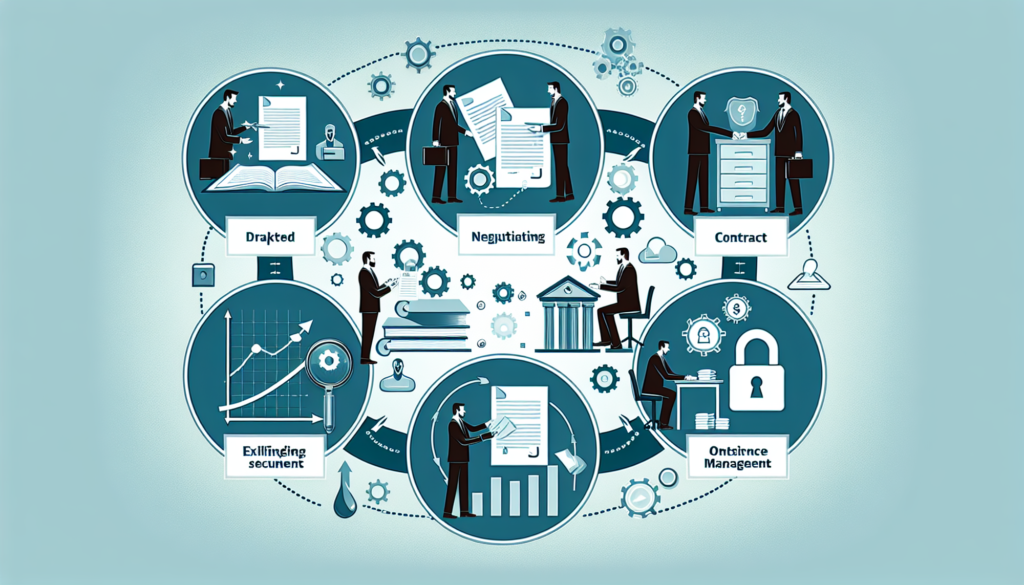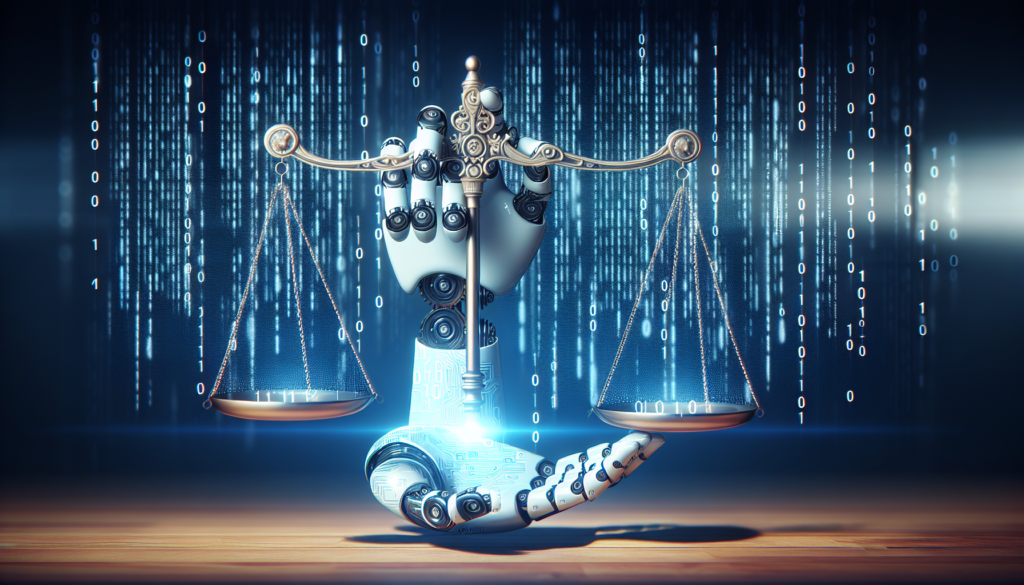The integration of AI technologies is reshaping the legal industry, marking a pivotal shift towards enhanced efficiency and accuracy. Compliance and Legal AI stand at the forefront, transforming how legal professionals manage regulatory compliance, leverage generative AI for case analysis, and harness AI models to streamline operations. This evolution promises to automate routine tasks, allowing practitioners to focus on strategic aspects such as client interaction and case strategy development.
As the industry navigates this technological pivot, it’s crucial to explore the role of Legal and AI in revolutionizing compliance, especially in sectors like renewable energy where regulatory demands are stringent. The subsequent sections will delve into how AI optimizes contract analysis and management, mitigates risks in compliance, and ultimately, shapes the future of legal practices through success stories and comparative analyses of AI contract management solutions.
Challenges in AI legal and regulatory landscapes
Navigating the complex world of AI legal and regulatory landscapes presents several challenges. Regulatory compliance is critical as AI helps law firms identify potential risks in contracts and other legal documents. However, this is complicated by the rapid evolution of AI, which continuously introduces new laws and increases the complexity of compliance across jurisdictions. This evolving scenario can lead to higher compliance costs and the need for organizations to stay constantly updated on both AI-specific laws and the impact of old laws on new algorithms.
Ethical considerations also play a significant role in the integration of AI within legal frameworks. Law firms must address biases in AI models to maintain professional integrity and safeguard client rights. The ethical deployment of AI necessitates ensuring data accuracy, reliability, and adherence to data protection laws. Moreover, AI systems can inadvertently perpetuate the biases of their creators, leading to discriminatory practices if not carefully monitored and adjusted.
The challenges extend to operational and strategic levels where companies face high initial implementation costs and a scarcity of skilled professionals. Resistance to change within organizations can hinder AI adoption, which is further exacerbated by concerns over data privacy and security. As AI systems require large volumes of data, ensuring the privacy and security of this data becomes paramount, necessitating robust compliance with data privacy requirements. The landscape is further complicated by the potential for AI to be used in criminal activities, requiring stringent internal policies to ensure AI aligns with company values and legal standards.
This article was written for you: Software asset management best practices
Key benefits of AI in compliance and legal fields
AI technologies are significantly transforming the compliance and legal sectors, particularly through enhancements in efficiency and accuracy. The automation of standard processes, such as document review and contract management, not only speeds up these tasks but also reduces the margin for error. This is crucial in fields like renewable energy, where regulations are stringent and constantly evolving. AI’s capability to process and analyze large volumes of data quickly ensures that legal professionals can make more informed decisions, thereby improving the quality of legal services and reducing costs.
Natural Language Processing (NLP) plays a pivotal role by enabling AI systems to understand and process human language in documents. This technology improves the searchability and translation of legal documentation, making it more accessible and easier to manage. Furthermore, AI-powered tools assist in drafting and reviewing contracts by flagging potential issues and suggesting modifications, which enhances the overall efficiency of legal workflows.
AI’s impact extends beyond just operational improvements; it also enhances client relationships. By automating routine tasks, lawyers can dedicate more time to client interaction and complex legal issues, thus providing a more personalized and efficient service. This shift not only boosts productivity but also helps law firms build stronger, more client-centered practices. Additionally, AI contributes to better risk management and compliance tracking, crucial for maintaining legal integrity in a highly regulated environment like renewable energy.
Navigating compliance in renewable energy with AI
Navigating compliance in the renewable energy sector with the aid of AI technologies presents a transformative opportunity for the industry. The application of Compliance and Legal AI in this field is pivotal for adapting to and managing the complex regulatory frameworks that govern renewable energy. AI systems excel in monitoring and analyzing regulations that frequently change and vary significantly between different geographical regions. This capability not only ensures compliance but also streamlines the process, reducing the risk of non-compliance penalties and enhancing operational efficiency.
AI technologies facilitate a proactive approach to compliance management. By integrating AI-powered analytics, companies can predict potential compliance issues before they arise and take preventative measures. This forward-looking approach is crucial in renewable energy, where environmental and safety standards are rigorously enforced. AI’s ability to process vast datasets enables it to identify patterns and anomalies that might indicate compliance risks, allowing companies to address these issues promptly.
Moreover, AI contributes to the strategic planning of compliance activities in the renewable energy sector. Through detailed data analysis, AI tools provide insights that help in making informed decisions about where to allocate resources effectively to meet compliance requirements. This not only optimizes operations but also supports sustainable business practices by ensuring that renewable energy projects comply with legal standards and contribute positively to environmental goals.

AI contract analysis best practices in renewable energy
In the renewable energy sector, adhering to best practices in AI contract analysis is crucial for maintaining compliance and optimizing contract management. Firstly, it is essential to implement AI systems that are specifically trained on renewable energy regulations and contracts. These systems should be capable of recognizing and interpreting the unique terminologies and clauses prevalent in this industry. By doing so, AI can provide more accurate analyses and recommendations, ensuring that contracts adhere to current laws and standards.
Secondly, continuous updating and training of AI models are vital. The regulatory landscape in renewable energy can change rapidly, and AI systems must evolve to keep pace with these changes. Regularly updating the training datasets with new regulations, court rulings, and contract templates will help maintain the accuracy and relevance of AI analyses. This proactive approach prevents the risk of outdated compliance advice, which could lead to legal challenges or penalties.
Lastly, integrating AI with human oversight forms a best practice that cannot be overstated. While AI can process and analyze large volumes of data at unprecedented speeds, the nuanced understanding and judgment of experienced legal professionals are irreplaceable. Establishing a system where AI-generated insights and analyses are reviewed and contextualized by legal experts ensures that the output is both technically accurate and practically applicable. This collaborative approach leverages the strengths of both AI and human expertise, leading to more robust and reliable contract management practices in the renewable energy sector.
AI solutions for renewable energy contract challenges
In the renewable energy sector, AI solutions are increasingly critical in addressing contract-related challenges. These technologies enhance the precision and efficiency of contract management, crucial for maintaining compliance with evolving legal standards. AI tools are adept at automating the extraction and analysis of key contract terms, facilitating faster and more accurate reviews. This capability is particularly beneficial for managing large volumes of contracts, which is common in projects involving renewable energy.
AI also plays a pivotal role in risk management by predicting potential contract disputes and compliance issues before they escalate. Through advanced analytics, AI systems can identify patterns and anomalies in contract data that may indicate risks, allowing companies to proactively address these issues. This not only minimizes legal risks but also reduces the potential for costly litigation and project delays.
Furthermore, AI-driven contract management systems support decision-making by providing comprehensive dashboards that offer insights into contract performance and compliance status. These systems enable stakeholders to make informed decisions quickly, ensuring that project timelines and regulatory requirements are met. The integration of AI in managing renewable energy contracts not only streamlines processes but also supports the overall sustainability and efficiency of energy projects.
This article might interest you: Commercial Strategies for increasing renewable energy asset performance
Comparative analysis of AI contract management solutions
In the realm of renewable energy, the comparative analysis of AI contract management solutions reveals significant distinctions in their capabilities and outcomes. One prominent solution excels in its ability to automate the extraction and analysis of contractual data, significantly reducing the time required for contract reviews. This system uses advanced machine learning algorithms to identify key terms and obligations, ensuring that all contracts comply with current regulations and standards.
Another AI solution focuses on risk management, employing predictive analytics to foresee potential disputes and compliance issues. This proactive approach not only prevents costly legal complications but also enhances strategic decision-making by highlighting risk areas before they evolve into serious concerns. The system integrates seamlessly with existing compliance frameworks, making it an invaluable tool for companies navigating the complex regulatory landscape of renewable energy.
Furthermore, some AI solutions offer sophisticated dashboards that provide real-time insights into contract performance and compliance status. These dashboards are instrumental for stakeholders needing to make quick, informed decisions regarding contract management and regulatory adherence. By comparing these solutions, companies can choose the most suitable AI tools to optimize contract management processes, mitigate risks, and maintain compliance in the ever-evolving field of renewable energy.
How AI mitigates risks in renewable energy compliance
In the renewable energy sector, Compliance and Legal AI play a crucial role in mitigating risks associated with regulatory compliance. AI technologies enhance the ability to monitor and analyze ever-changing regulations and standards. By utilizing advanced algorithms, AI systems can swiftly interpret vast amounts of regulatory data, ensuring that all operational activities are in line with current legal requirements. This real-time monitoring helps in identifying potential non-compliance issues early, allowing companies to rectify them before they escalate into costly legal problems.
Furthermore, AI aids in risk assessment by providing predictive insights into areas of potential non-compliance. By analyzing historical data and ongoing compliance trends, AI models can forecast future risks, enabling proactive management strategies. This predictive capability is invaluable in the renewable energy sector where compliance requirements can be particularly complex and subject to frequent changes.
AI also supports the implementation of robust compliance frameworks by automating the documentation and reporting processes. This automation ensures that all necessary compliance records are accurate and readily available, which is critical during audits or regulatory reviews. By streamlining these processes, AI not only reduces the administrative burden but also enhances the transparency and traceability of compliance measures, further reducing the risk of non-compliance and associated penalties.
How AI transforms renewable energy contract management
Artificial Intelligence (AI) is reshaping contract management in the renewable energy sector by introducing advanced tools that enhance efficiency and accuracy. One of the primary transformations is the automation of contract drafting and review processes. AI technologies, equipped with Natural Language Processing (NLP), can automatically generate draft contracts based on predefined templates and rules. These tools analyze existing contracts to identify standard clauses and tailor them according to specific project requirements, significantly reducing the manual effort involved and minimizing human errors.
Another significant impact of AI on contract management is in the area of compliance monitoring. AI systems are designed to continuously scan legal and regulatory updates, integrating these changes into the contract management system in real-time. This ensures that all contracts remain compliant with the latest regulations without the need for manual oversight. For instance, if new environmental standards are enacted, AI tools can promptly adjust the compliance clauses in ongoing and future contracts, thus safeguarding companies against legal risks and penalties.
Furthermore, AI enhances decision-making in contract negotiations by providing predictive analytics based on historical data. AI models can predict the outcomes of contract terms and conditions, offering insights that help negotiators make informed decisions. This capability not only streamlines the negotiation process but also optimizes contract terms in favor of renewable energy projects, ensuring they are both profitable and compliant. By automating and enhancing various facets of contract management, AI is proving to be an indispensable asset in the rapidly evolving landscape of renewable energy.
Success stories of AI in renewable energy contracts
In the renewable energy sector, the integration of AI in contract management has led to remarkable success stories that highlight the transformative impact of this technology. One notable example is a major solar energy company that implemented AI to streamline its contract management processes. The AI system was designed to automatically analyze and categorize contract clauses, which significantly reduced the time needed for legal reviews and improved compliance with environmental regulations. This not only expedited project timelines but also minimized the risk of penalties associated with non-compliance.
Another success story involves a wind energy provider that used AI-powered tools to enhance its negotiation capabilities. By leveraging historical data, the AI model provided predictive insights that helped the company anticipate contract disputes and adjust terms proactively. This strategic use of AI not only improved the efficiency of negotiations but also resulted in more favorable contract terms, enhancing the profitability and sustainability of their projects.
Furthermore, a geothermal energy firm adopted AI to manage its international contracts across different regulatory environments. The AI system was equipped with the capability to learn from diverse legal frameworks and suggest compliance strategies tailored to each region. This adaptive approach allowed the company to maintain high compliance standards globally, ensuring smooth operations and fostering trust among stakeholders. These stories collectively demonstrate how AI is revolutionizing contract management in the renewable energy sector, providing companies with the tools to navigate complex legal landscapes more effectively.
The future of AI compliance
The landscape of AI in compliance, particularly within the renewable energy sector, is poised for significant growth and transformation. Projected to reach around USD 117.72 billion by 2033, the integration of AI in these fields is not only enhancing efficiency but also reshaping legal and ethical standards. As AI technologies evolve, they bring forth new challenges and opportunities, particularly in enhancing Environmental, Social, and Governance (ESG) practices. AI’s capability to analyze vast datasets can lead to more sustainable operations and transparent corporate behaviors, significantly impacting how companies adhere to regulatory standards and manage risk.
Legal professionals are now required to adapt to these technological advancements. The future demands attorneys to be proficient not just in law but also in selecting and utilizing the right AI tools. This dual expertise will be crucial in constructing queries and evaluating the outputs for relevance and accuracy. As AI continues to permeate the legal landscape, its integration with blockchain technology presents a promising frontier. This synergy could revolutionize contract management and compliance further, offering more robust solutions against the backdrop of increasing legal complexities.
Moreover, AI’s role in promoting ESG initiatives is becoming indispensable. From improving energy efficiency to ensuring ethical supply chains, AI applications are setting new standards for corporate responsibility. The technology’s predictive capabilities are vital for preemptive risk management, potentially reducing legal liabilities by identifying compliance risks before they manifest. As we move towards a more interconnected and regulated world, the fusion of AI with compliance strategies offers a pathway to more resilient and ethical business practices.
Conclusion
Throughout the exploration of AI’s integration into compliance and legal frameworks, particularly within the renewable energy sector, it has become evident that this technology is not just an auxiliary tool but a transformative force. Its capabilities in enhancing operational efficiency, ensuring regulatory compliance, and pioneering risk management practices illustrate a pivotal shift in how legal professionals and companies navigate the complex landscape of legal obligations and ethical considerations. The significance of these advancements underscores the evolving nature of legal practices, steering them towards more sustainable and efficient processes that are in step with today’s digital world.
As we look to the future, the trajectory of AI in revolutionizing the compliance and legal sectors suggests a landscape rich with opportunities for innovation and improvement. The integration of AI offers a promising pathway to not only streamline tedious processes but also to foster a more ethically responsible and transparent approach to legal and compliance challenges in the renewable energy sector and beyond. By embracing this technological evolution, the legal industry stands on the brink of a new era where efficiency, accuracy, and strategic foresight are not just ideals but tangible realities. The journey ahead is marked with promise, as AI continues to redefine the parameters of legal competence and operational excellence.
FAQs
1. How is artificial intelligence transforming various industries?
Artificial intelligence (AI) enhances the efficiency of corporate operations and reduces costs by allowing machines to handle tasks typically requiring human intellect. AI assists in repetitive tasks, freeing up human resources for more intricate problem-solving activities.
2. What advantages does AI offer in the legal sector?
AI contributes several benefits to the practice of law, including:
- Increased efficiency and time savings.
- Enhanced legal research capabilities.
- Improved accuracy in document review.
- Utilization of predictive analytics.
- Reduction in costs.
- Better due diligence.
- Availability around the clock.
3. In what ways is AI altering the legal industry?
AI is transforming the legal field by providing crucial support in various roles within law firms and legal departments. It boosts efficiency, speeds up processes, and allows legal professionals to concentrate more on leveraging their expertise, rather than replacing them.
4. How is AI revolutionizing society at large?
AI revolutionizes society by its ability to process and analyze vast amounts of data, transforming these analyses into easily understandable visual formats. This capability speeds up the decision-making process, as company leaders can rely on instant insights for informed decisions, without the need to delve into the data themselves.
Are you seeking to grasp your renewable energy contracts without a legal team? We excel in demystifying this process, making it quick and straightforward without the need for attorneys. Request a demo to explore how we can help enhance your processes efficiently.
Remember that you can return to Contract Power whenever you need help with contract management, or visit our blog if you want to stay informed.









